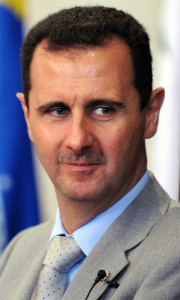
Why so, Syria?
- Alex Hawley
- 0
- Posted on
 Syria, we still talking about Syria? A lot of ink has been spilled over which course of action should be taken following the use of chemical weapons a month ago. Should the US, UK and France intervene against the Syrian army and if so what would such an ‘intervention’ look like and achieve?
Syria, we still talking about Syria? A lot of ink has been spilled over which course of action should be taken following the use of chemical weapons a month ago. Should the US, UK and France intervene against the Syrian army and if so what would such an ‘intervention’ look like and achieve?
I read a few arguments on this and watched the debates in Westminster, at which it was decided that the United Kingdom would not be involved in any military action. In none of the papers, websites or debates was a good argument put forward that bombing, however targeted, would itself achieve a positive outcome. Thankfully, at least for the moment, sanity seems to have won the day and there’s no current escalation of the war.
The point I’d like to make is that this far into civilization, it really isn’t up to the United States or the United Kingdom or France or any other single country to make judgments and pass sentence on another nation. I won’t get into preaching about their role in international warfare since 1945. There are plenty of arguments to be had either way; suffice to say it’s been a mixed bag. The point is that it’s well past time the world had a true policeman. The United States has taken it upon itself to have this role, but in reality it acts more like a mafia boss or a feudal lord than an officer of the law. Depending on whether or not it suits its own interests it will intervene to halt, provoke or prolong a conflict. Sure, some policemen also do this, but we call these policemen ‘crooked’ and rightly so.
Perhaps the most important quality a policeman must have is impartiality. When US and UK leaders talk about intervention being in the national interest, they have immediately disqualified themselves from the role of an adjudicator. We don’t hear police spokespeople talk of what is or isn’t in the best interests of the police! They talk about public safety. There’s no such obligation upon the POTUS and nor should there be. It’s not part of the job.
In theory there kind of is such a role. The UN is called upon to do a few inspections, advise whether or not military engagement would be legal and then do precisely nothing if their advice is duly ignored. If the US is the mafia then the UN is a part-time community services officer waiting on a name badge.
What’s needed is a proper governing international body, one with real power and which can’t be overruled, ignored or have its decisions vetoed by the scariest gang on the block. Again, if compared to domestic police, in normal civilised societies the police hold a near monopoly on the use of force. If they don’t have this, it soon ceases to be a civil society. When it comes to the right to exercise violence or impose penalties, market forces don’t apply and when they do it tends towards anarchy.
This is true not only of the police analogy, but applies across society at every level. If industries are left unregulated then businesses within them become monopolies, disadvantaging everyone except the controlling business in question. When that business is a bank, then eventually the whole economy pays the price. Every sector of society has rules and those overseeing the rules not only have no vested interests; we go to great lengths to make sure they don’t. The piggy in the middle has to be impartial: from parents stepping in between two siblings to the Speaker of the House. We know this for every area I can think of…except the small matter of managing the whole world.
Conspiracy theorists are often warning us about a one world government, but this is exactly what is needed, at least when it comes to managing interventions. A neutral third party with control over the use of force works in defusing tension and decreasing violence at every level, from family feuds to gangs to warring villages, to cities, duchies, provinces, and counties. It seems reasonable to assume that trend, if applied internationally would carry on.
Right, that’s enough from me. I’m not usually a fan of blog discussion, but as this is something of an unformed rant or a ‘starter for ten’ I’d love to read what Ruminator readers think the answer is on this occasion…as I’m reasonably sure this is where the fate of humanity will be decided. More government or less? A very big brother or joyful anarchy?
If you like something you’ve read on The Ruminator, please consider making a donation via Givealittle

